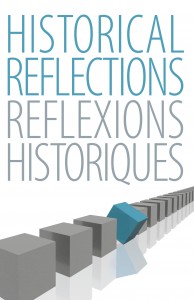 This is the first in a series of posts dedicated to celebrating the 40th volume of our journal Historical Reflections/Reflexions Historiques.
This is the first in a series of posts dedicated to celebrating the 40th volume of our journal Historical Reflections/Reflexions Historiques.
The latest issue of the journal is devoted to the special topic of “War, Occupation, and Empire in France and Germany.” This post is the transcript of an electronic interview between the issue’s Guest Editor, Jean Elisabeth Pedersen, and one of the six contributors, W. Brian Newsome.
Pedersen: What drew you to the study of Maxence Van der Meersch and his novel Invasion 14?
Newsome: Several years ago, I was conducting research on the Young Christian Workers and its adult offshoots. Specifically, I was interested in the theology of the Mystical Body of Christ and the ways in which chaplains and lay leaders in Catholic Action groups absorbed and acted upon principles associated this theological concept. My research led to “The Mystical Body of Christ: A Vector of Engagement for French Catholic Action, 1926-1949,” an article that appeared in Politics in Theology, part of Transaction Publishers’ series Religion and Public Life, ed. Gabriel Ricci 38 (June 2012): 147-172.
In the course of my investigation, I came across Pêcheurs d’hommes (1940), Maxence Van der Meersch’s novel about the Young Christian Workers in Roubaix. I had only read of Van der Meersch in passing, and I had never before read any of his books, but I found his portrait of the Young Christian Workers fascinating. I thus became interested in Van der Meersch. Why did he write this novel? And what else did he write? How influential was he?
I discovered that Van der Meersch was reared as a secular humanist but converted to Catholicism in 1936, following the death of his infant daughter. Clerical friends in Roubaix introduced him to chaplains and lay leaders of the Young Christian Workers, and Van der Meersch was so taken with their story that he developed the novel. Van der Meersch had won the Prix Goncourt in 1936 for L’Empreinte du Dieu, the tale of an incestuous love affair, but by far his most well-known book was Invasion 14, his novel about the German invasion and occupation of northern France during World War I. Van der Meersch lived through the ordeal himself, and he tackled controversial subjects—including collaboration—with frankness and nuance, resulting in a storm of controversy in northern France even as he won national and international praise for equitable treatment of Franco-German relations. Invasion 14 struck me as Suite française for World War I. I was intrigued. And as I dug deeper into Van der Meersch and the novel, I discovered the centrality of themes of race and empire: the subject of my article in this edition of Historical Reflections/Réflexions historiques.
Pedersen: What aspect of writing this work did you find the most challenging? The most rewarding?
Newsome: The most challenging aspect of the research was deciphering Van der Meersch’s handwriting, which was notoriously sloppy. Working in the naturalist tradition of Émile Zola, Van der Meersch conducted extensive documentary research and oral interviews. He spent a great deal of time “in the field.” However, he preferred to compile his notes, sketch his narrative, and pen his text while sitting up in bed. As a result, his handwriting was often quite poor. When I began working in the Archives Maxence Van der Meersch, I needed a few days just to become accustomed to the writing style. Monsieur Victor Godon, who managed the archives at the time, had considerable experience with Van der Meersch’s handwriting, and he gave me some pointers that proved invaluable.
Once I became comfortable with Van der Meersch’s handwriting, what I found in his notes was simply fascinating. Van der Meersch took and preserved such careful notes that one can readily piece together the way he assembled characters and plot, providing insights that proved invaluable for this article on themes of race and empire.
Pedersen: To what extent do you think the article will contribute to debates among current and future academics within the field?
Newsome: In recent years scholars have begun devoting increasing attention to the German invasion and occupation of northern France during World War I. As they have done so, they have begun reconsidering Invasion 14. Neither literary scholars nor historians, however, have examined the novel’s themes of race and empire or the ways in which Van der Meersch’s use of those themes contributed to the controversy that the novel created. My article fills this gap, thereby adding nuance to the scholarship on Van der Meersch and Invasion 14 and in turn contributing to the growing scholarship on the occupation and the way participants remembered it in the years after World War I.
Look for more posts devoted to this volume of Historical Reflections in the coming weeks, as well as the forthcoming issue of the journal (to be published in the summer of 2014)!
